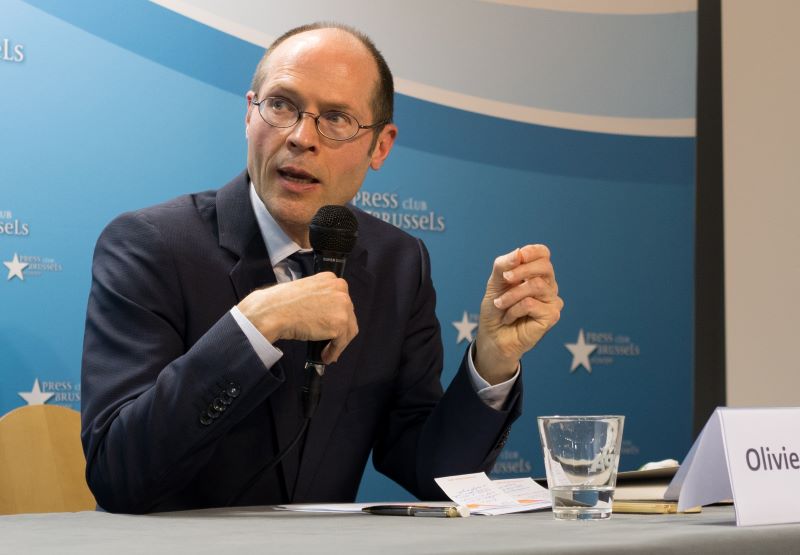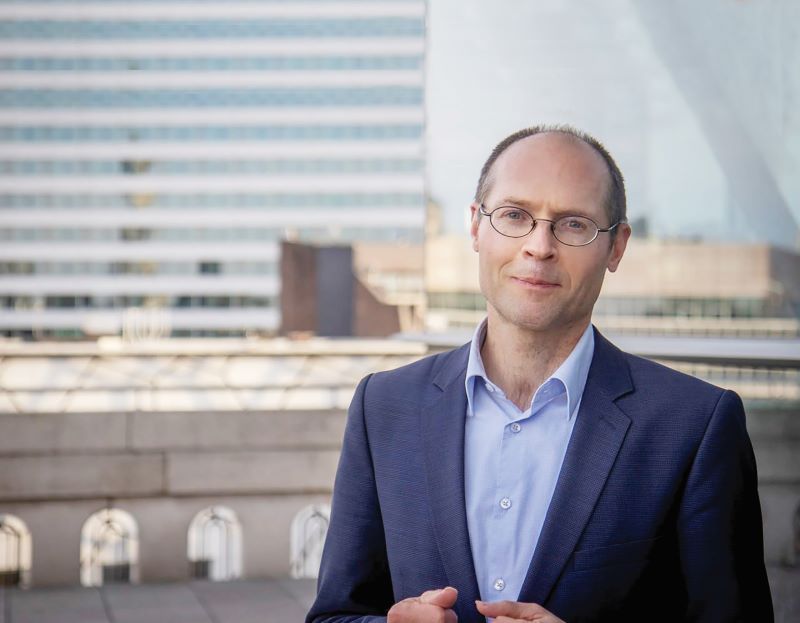Interview with the 2023 WHRCF Keynote Speaker: Olivier De Schutter
By Jonathan Joseph Chiarella
Delivering the keynote speech at Gwangju’s 13th annual World Human Rights Cities Forum is Dr. Olivier De Schutter, the UN Special Rapporteur on Extreme Poverty. For the Gwangju News, Chiarella and De Schutter corresponded on the conference’s themes.
I. Austerity and Poverty
Jonathan Joseph Chiarella (JJC): How do poverty and the “right to development” relate to human rights? How do you make human rights go beyond simply being free from interference?
Olivier De Schutter: Governments should not only allow people certain freedoms – to express themselves, to exercise a religion, or to have a family life. They also should provide services and social protection allowing people to lead decent lives. The two are closely connected, however. Governments that are not accountable to the population will not work for the population and will not prioritize what’s in the public interest.
[The government should provide services (e.g., housing, jobs) to empower the public, because only if the public is empowered will the government serve the public. – JJC]
JJC: After the 2008 Financial Crash, larger organizations like the European Union implemented “austerity” policies. How do “austerity” policies hurt local governments?
Olivier De Schutter: There is now a widely shared consensus that the reaction to the 2008-2009 financial crisis, in the EU and elsewhere, was inappropriate. The rise in public deficits resulting from bailing out major financial institutions to rescue the financial system was followed by policies intended to swiftly reduce the public debt and thus to reassure the markets, but all too often this was done too early and at a huge cost to the population.
Greece was particularly affected, with successive bailouts that were provided against a commitment to downsize public services, including in crucial sectors such as health and education. … It took ten years for Greece to recover from that shock. This shows the need to carefully assess the human rights impacts of such economic reforms when designing and implementing them. Local governments, who are at the frontline of service delivery and in direct contact with the population, should be involved in such assessments to avoid destructive impacts on the ability of people to live decent lives.
JJC: How can local organizations improve the lives of their citizens – even when the country’s GDP is not growing?
Olivier De Schutter: The right to development is not about creating the conditions for GDP growth. Quite to the contrary, in fact. It is about ensuring that governments put the well-being of people and the realization of human rights above economic growth.
This was the message of the UN General Assembly when it adopted the Declaration on the right to development in 1986, and this was the intention of […] the Human Development Report series by the UNDP in 1990, strongly inspired by the work of [Indian economist] Amartya Sen.
Local governments are therefore essential to the realization of the right to development, since they are often leading in areas such as health, education, housing, or the building of rural infrastructures. In my country missions, I have often witnessed local governments as redirecting development towards ensuring the population’s well-being, while central governments try to create the conditions for economic growth (through macroeconomic policies, trade agreements, incentives to foreign investors, etc.
II. Experience as Rapporteur and Scholar
JJC: What is it like fighting for human rights as a Special Rapporteur at the UN?
Olivier De Schutter: This is a unique position from which to advocate for change. On the one hand, because it is an unpaid position (I am not a public servant of the UN), I have no fear of displeasing anyone – I do not fear losing my job or failing to get promoted – which allows me to be very frank in my assessments. On the other, I have the support of the UN and the international community. Special Rapporteurs of the UN Human Rights Council are the “eyes and ears” of the international community, since they report back to governments sitting on UN bodies. I therefore routinely find myself having to state findings or to encourage reforms which many parts of the UN system share and encourage but cannot express as candidly.
JJC: Globalization can make anti-corruption and anti-poverty missions difficult, but globalization can provide unique benefits, too. How should we use globalization?
Olivier De Schutter: Globalization can be a powerful tool for poverty reduction and for the realization of human rights, but it should be a means to an end, rather than an end in itself. Trade should be linked to compliance with environmental standards and labor rights in order to encourage a race to the top rather than a race to the bottom. Investment should be a tool to support local communities, rather than a way to increase the profits going to shareholders. Transnational corporations should pay decent wages and their fair share of taxes, rather than exploiting workers in low-wage jurisdictions and practicing aggressive tax optimization strategies as they do with price transfer mechanisms or declaring profits in tax havens. … Globalization should be tamed if it is to become a tool for human rights-based development.
JJC: Describe the relationships that the UN has with localities.
Olivier De Schutter: The UN has traditionally worked with national governments. It is only recently, over the past decade or so, that it has come to acknowledge the important role of cities and local governments in the realization of human rights.
This evolution is essential, however. There are often too many veto points within central governments, and too many opportunities for capture of decision-making by corporate actors. In contrast, opportunities for direct participation and accountability towards the people are much more significant at the local level. Moreover, local governments are better placed to ensure adequate coordination between different policy areas to ensure a coherent approach to societal challenges.
It should therefore come as no surprise that the center of gravity of political innovation is now shifting to cities and local governments. The UN can encourage this by encouraging the sharing of good practices and by encouraging central governments to see this as an opportunity. [Central governments] should enable cities and local governments, rather than impede them or see the growing role of these actors as a threat.

III. World Human Rights Cities Forum 2023
JJC: How can local actors best promote human rights amid the calamity of severe poverty?
Olivier De Schutter: Poverty has often been addressed by combining economic growth with redistribution: Growth is meant to finance public services and social protection through progressive forms of taxation. This approach is insufficient. We need to also address poverty [through] pre-market measures, rather than only [through] post-market redistribution.
… We need to build an inclusive economy that works for all. We should simply compensate the losers of an extractive type of economy. This approach also makes us less dependent on [economic] growth, which is seen less and less as desirable due to the enormous metabolism of energy and matter required….
JJC: How can we make solidarity among various people and places become real?
ODS: “Solidarity” is a widely underused but powerful idea in the UN’s work. It is a way of recognizing that we are interdependent and that no group, no country, no actor will improve its own situation sustainably unless the needs of others are taken into account.
Countries extracting resources from other countries through unfair trade deals or by failing to tackle abuses by corporations will create the conditions for failed states that could provide a haven for terrorists, lead to the radicalization of the youth, or encourage large-scale migratory flows. Buyers in global supply chains that cheat their suppliers or encourage these suppliers to underpay their workers may soon lose these suppliers or see them go bankrupt, and so on.
Ultimately what is key is to recognize that no actor can improve his position at the expense of others. That is solidarity. It is the opposite of policies focused on short-term gains and on extraction.
JJC: Market laws of land ownership and housing can make equality difficult to achieve. How have some cities or counties successfully achieved a fairer distribution of property?
Olivier De Schutter: Cities, but also local governments in rural areas, are increasingly rediscovering commons-based approaches to the management of resources such as land, water, and forests, but also of institutions such as healthcare or education. What this means is that such resources or institutions should be governed democratically, by the users themselves, rather than through the diktats of central governments or by private actors driven by profit-seeking motives. Beyond bureaucracy and markets, the commons are a far more sustainable way of governing resources and institutions: [They are] more focused on people’s needs, better informed by their lived experiences, more attentive to long-term sustainability, and empowering rather than dis-empowering.
[One can also see that individualized consumption does not serve the needs of the masses nor our environments. If one applies this to Korea, the competitions for personal qualifications (“specs”) and product accumulation make daily life less accessible overall. However, the more opportunities and benefits that are in the commons, the less that the downsides of the market can cause damage. The more public services we have for the poor, the more democratic our societies will be. Local governments are on the “front line” of this struggle. Speakers at this year’s Forum will share stories of hardship and success from all over the world. — JJC]
The Author
Jonathan J. Chiarella grew up in New York. He holds a BA in history (Rochester) as well as two MA’s (Chonnam, Florida), and a PhD in politics (Florida). You can spot him riding the river trails or read his analysis of current affairs related to the Honam area or international relations.







